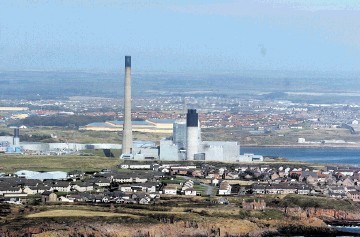
The Government’s decision to axe UK’s carbon capture plans showed a complete “lack of understanding” according to the director of Scottish Carbon Capture & Storage (SCCS).
Professor Stuart Haszeldine said: “The Treasury’s axing of the UK’s CCS competition brought a great deal of criticism. It was a premature decision, made before the two preferred project bidders, White Rose and Peterhead, had even submitted their design studies. It also reflected a lack of understanding of the strategic value of CCS to the UK’s climate ambitions as well as our perceived leadership on climate action globally.
“After the Paris CoP21 climate agreement for advanced economies to become zero-carbon by 2050, it is clear that CCS is unavoidable. Yet, remarkably, that deal was struck just one week after the Treasury’s cancellation decision. The lack of foresight or joined-up thinking across Government departments was baffling.”
Professor Haszeldine spoke out after to a new report said the cancelling a £1billion competition to develop technology to capture and store carbon emissions would have major repercussions in meeting climate targets.
“Today’s report by the National Audit Office reaches the same conclusions that previous analyses have shown – namely, that CCS has immense value across an entire economy. It is not about expensive electricity, it is about the sustainable use of fossil fuel wealth. It means the provision of low-cost, carbon-free heat, and a cleaner atmosphere worldwide,” Professor Haszeldine said.
“The development of a UK-based CCS industry also has the potential to maintain and grow the UK’s workforces in process, chemical and manufacturing industries. Overall, CCS means meeting carbon targets and playing our part in protecting society and the environment from the worst impacts of global warming.
“This report is very critical of the Treasury’s lack of success at working across departments to join up expenditure on the one hand with clear benefits on the other; in this case, clear cost savings in the long-term as part of decarbonising the UK’s power, industry, heat and transport sectors.”
The decision, which led to the “collapse” of the industry, will lead to higher costs for the government, according to Professor Haszeldine.
“The cancellation of two well-developed CCS projects in 2015 has led to a collapse of industry interest in building projects in the UK. This will mean that, when projects are eventually built, the Government will need to pay more to convince industry investors that the UK can be trusted to deliver on its contractual promises. That is bad value for consumers, for industry and for the climate,” he added.
“Treasury decisions have a history of being made impatiently, where short-termism is unable to support fundamental change that requires many years of design evaluation, demonstration, confidence building and construction. This does nothing to help UK industries build new global successes in an outward facing global economy.
“Now, with the UK’s decision to investigate leaving the European Union, developing and maintaining global expertise in science and technology design, consultancy and construction is more pertinent than ever.
“Energy is one of the biggest global markets. CCS is one part of that market, where UK Government support could boost innovation and invention to ensure that the UK becomes a natural exporter of CCS expertise and consultancy, not an importer.
“It is clear that, when making assessments of long-term infrastructure needs, such as CCS, the Treasury need to be more sophisticated in its assessment of value and less driven by simplistic calculations of near-term profitability.
“The transition of the UK into a low-carbon economy will not be achieved overnight, and investment from the Government over many decades and across multiple sectors is not an optional extra. It is essential.”
Recommended for you
